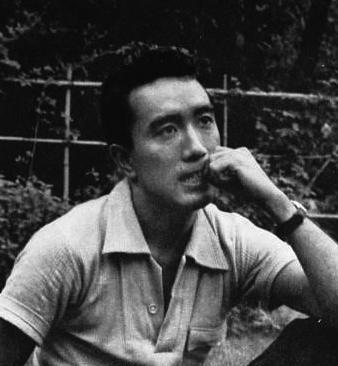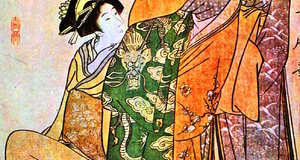From Discussions VOL. 9 NO. 2Overcoming Modernity in Yukio MishimaFor Mishima, there were two elements that made up the core of Japan. Chrysanthemum embodied the refined and peaceful side of Japanese society: poetry, fine arts, flower arrangements, tea ceremonies, and so forth. The Sword, on the other hand, encapsulated the harder, more aggressive or military aspects of Japan, such as the Bushido. In contrast to this culture which Mishima exults and sees as an overcoming of modernity, Mishima despises the state of society he is in. He defines this as culturalism. Mishima explains: “Culturalism indeed is rampant in the world. . . . In a word, culturalism is a tendency to cut off culture from the life of its bloody womb and procreation, and to judge culture by some joyous humanistic achievements.”14 When referring to Japan’s state at the time he wrote this work, he is likely referring to the Japanese constitution, particularly Article 9. Article 9. Aspiring sincerely to an international peace based on justice and order, the Japanese people forever renounce war as a sovereign right of the nation and the threat or use of force as means of settling international disputes. In order to accomplish the aim of the preceding paragraph, land, sea, and air forces, as well as other war potential, will never be maintained. The right of belligerency of the state will not be recognized.15 This article bars Japan from ever taking up arms again. The removal of war from Japanese culture not only removes the Sword from society, but all of the warrior virtues that had been associated with it and which had subsequently permeated Japanese society. As a result, Mishima bemoans the future of Japan: I cannot have much hope for the future of Japan. As days pass, I feel more and more deeply that if things should proceed this way, “Japan” might end up disappearing. Japan might disappear, and in its place, a large economic country, which is inorganic, vacant, neutral, medium colored, wealthy, and shrewd, would remain at one corner of the Far East. I don’t feel like conversing with those people who think that that is all right.”16 By embodying the ideal of the Sword and the Chrysanthemum, Mishima made himself a symbol of that ideal. With its blend of Apollonian order and Dionysian impulse, Mishima hoped to use the “Tragic” finally bridge the gap between rationalism and magic that had persisted since the Renaissance. The Apollonian elements were taken primarily from Western aesthetics and technology, while the Dionysian elements were searched for in traditional Japanese culture. He looked to the Samurai Spirit as a code to follow and the emperor as the Grand Cause for which men would give their lives. Mishima described part of the Japanese Spirit as “a navy officer leaping from a human torpedo, brandishing his sword on a moonlit night”17 The submarine represents the Western or Apollonian technology, the sword wielded by the officer is obviously representative of the samurai, and the moonlit night adds a sense of tragic romanticism. The officer cannot not hope to overcome whatever it is he is hoping to defeat by leaping from the human torpedo with only a sword as a weapon, yet it is not victory he seeks, rather glorious death. It is this fatalism which is at the core of Mishima’s philosophy. Of all aspects of human existence, death alone can never be disenchanted because it can never be fully comprehended. Mishima viewed himself as this symbolic hero, the tragic personality destined for glory. His glory was to rejuvenate Japan. He had already done it in writing and now he sought to do it through his final act of life. Much of what Mishima hoped to achieve by his death can be summed up in his own description of the purpose of his film, Patriotism: What I ultimately aimed at in Patriotism as a cinematic work was not a drama, but rather, a pre-dramatic, religious dromenon, something similar to an agricultural sacrificial ritual or a magical ritual of excitement, destruction, and rebirth of human’s botanical fate in nature. Therefore, the work [Patriotism] must be something that arouses human’s most primitive emotional upsurge akin to joy in hunting or something like a reenactment of an anti- civilization ritual in which the audience, together with the hero, also revive in terror and shock so intense that they cover their eyes.18 He hoped to shock his audience but at the same time inspire them through the terror that they would experience. Such a shock, Mishima believed, would awaken Japan’s latent spirit, which would cast off what he believed was the vacuous façade of present Japan. When Mishima attempted to take over the SDF headquarters in Tokyo on November 25th, 1970, he envisioned himself as enacting a ritual of rebirth for Japan. He imagined that he, as Hitler states in his play, My Friend Hitler, would “make all the people taste a tragic sentiment through and through.”19 There was no hope of victory and no hope of escape. Even if Mishima succeeded in inspiring the troops at the SDF headquarters, the coup was doomed to end in abysmally bloody failure, with all those who would have joined him either committing seppuku or being executed. Mishima was to be the “Tragic” sacrifice through whose death, presided over by the Ten’no, would reinvigorate Japan and end the dominance of Western modernity over culture. If Mishima’s views are truly the means to overcoming modernity, then it is clear that such an “overcoming” would be fraught with an immense amount of blood, death and suffering. As a measure of success or acceptance of his philosophy, at the time of Mishima’s death, the response to his suicide was one of consternation and confusion. Even today, only small groups of devotees promulgate Mishima’s “Tragic” philosophy. Nevertheless, Mishima’s struggle highlights for us the necessity to understand the complex relationship between modernity and the traditional sensibilities of not just Japan but any nation, particularly in an age of political and economic instability when the questions of culture and globalism step out of obscurity and into the open. AcknowledgementsI would like to thank Dr. Hagiwara for advising me on this project and for the many interesting discussions which the project has prompted. References
Suggested Reading from Inquiries Journal
Inquiries Journal provides undergraduate and graduate students around the world a platform for the wide dissemination of academic work over a range of core disciplines. Representing the work of students from hundreds of institutions around the globe, Inquiries Journal's large database of academic articles is completely free. Learn more | Blog | Submit Latest in History |





















